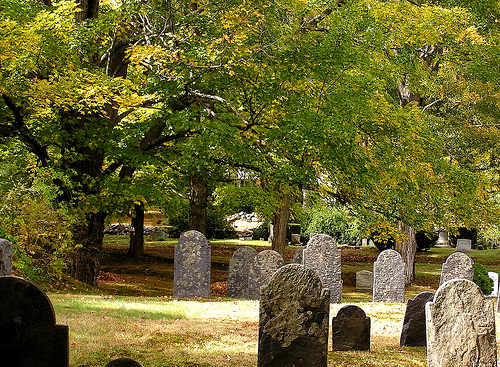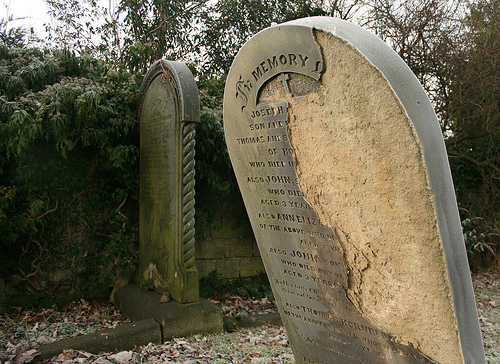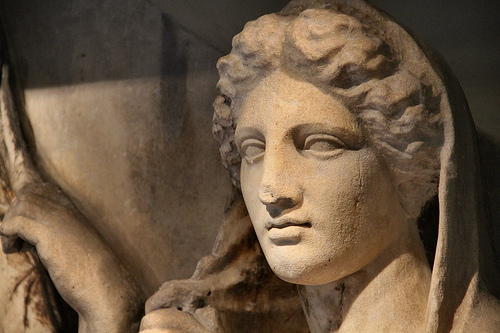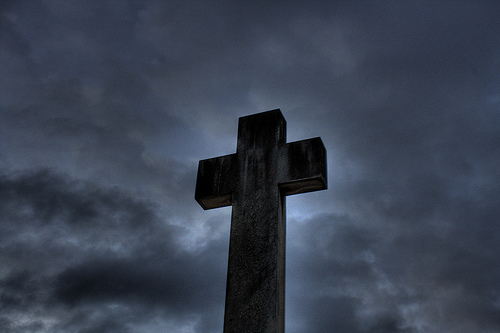The thing about death is that the experience is different for everyone. That's the problem. The country is full of people skirting the issue and crossing their fingers, hoping against hope that they aren't called upon to deal with it. That someone else will just take care of it. That it won't be them. Our culture is sort of like that.
I spent the better part of my 20s caring for one parent dying of cancer…and then the other. During that time, I lost two close family friends and two grandparents, as well. In addition, I watched as aunts, uncles, siblings, close friends, and countless acquaintances simply faded away, unwilling or unable to deal with the cloud of illness and loss that enveloped me and my family. Now that the dust has settled somewhat, and I remain in my parent's home, trying to keep it safe from banks and bill collectors, I find myself in the eye of a still-raging storm. The people I needed who couldn't bring themselves to help are slowly creeping back, one at a time, secure in their decision to abandon ship, comfortable in their continued ignorance of what we went through and happy to pretend that it didn't happen. I love them all and forgive them for abandoning me. Well, most of them, anyway. But a switch has been flicked. A light has gone on. I am angry and compelled to speak out from an insider's perspective. A long conversation is required to make this right.

An old tree stands guard over graves in South Cemetery in Boxborough. Photo credit: Liz West. Used under Creative Commons license.
After my mother died, I put together a detailed workshop on how to be a family caregiver. No one, I thought, knew better than me about the pitfalls of blindly following doctors' advice, disability insurance, nurses who hadn't had their coffee, navigating the social security office, and relatives whose biggest contribution was standing directly in the way, arms akimbo screaming “What do I do?” It was obvious that people didn't know how to deal with death and dying and that a community class was the perfect beginning.
Except that I couldn't sell it. I submitted the proposal for my workshop to every community education system in town. Even the Learning Exchange wouldn't return my call. It seemed no one was comfortable asking people to pay money to learn about the process of dying and how to be a living advocate for those leaving us. No one wanted to be responsible for telling people that, despite their best efforts, they probably weren't prepared.
So why is it, then, that all of the 30-somethings who populated my home daily — dropping by to leave food, helping me pack up the remnants of the life that had left us — seemed so excited about it? What could it be that was prompting so many requests for information and so little interest on the part of organizations designed to disseminate knowledge? Was it that we were all staring down the barrel of a recession and calculating how much longer our aging parents would be able to care for themselves? Maybe some of us had already begun to sort through the price tags attached to nursing homes and assisted living facilities for our grandparents and had smelled the proverbial coffee.
I suspect that the predominate issue is that we are a culture that ignores death and pretends it away. It makes us uncomfortable so, en masse, we have decided to act as if it simply doesn't exist. It's frustrating when the time comes to face facts without a posse of people to help, or give advice. It's infuriating. It's the grim reality we live in these days.
Think about this… from the fourth grade on, we teach children about what it means to reproduce. We rarely mention what it means when life ends. This is given over wholly to religious institutions and families. The basics of death remain a mystery well into adulthood for many. Conversely, all little girls are told — at one time or another — through movies, church, or female relatives and friends, that the process of birthing is painful. Whatever comes with that revelation, no one gets to the point of actually giving birth and finds themselves shocked and mystified by labor pains. Why is it, then, that people are so horrified by the experience of watching someone die? How is it that such an inevitable process can be such a close-kept secret in our society? What is gained by making the final experience of life so shocking?
I believe that the end of life is kept mysterious by a cultural predilection for sticking our heads in the sand and keeping them there. Children are kept out of hospital rooms in order to be spared the final image of a loved one dying. Nurses tell you to go home and get some rest. Hospice reminds you that, deep down, everyone wants to die alone and that you should feel free to get on with your own life. Relatives stay away or focus attention on the family's spiritual practice and beliefs about the location of that person's soul … sometimes before they are gone. Care is given over to doctors or nursing homes as no one feels “qualified” to deal with death.

A gravestone from the graveyard on Fink Hill, Horsforth. Photo credit: Andrew Dyson. Used under Creative Commons license.
Most people in America reach adulthood having never witnessed a life ending outside of the movies. We don't know what it looks like, smells like, sounds like. And, most of all, we have zero concept of our own role in the process of a someone's demise. We don't know if it hurts. We don't know what to do for them or their loved ones. Worst of all, the people around us don't seem to either. We are each left alone to figure it out as best we can. It's our last chance with someone, and each and every one of us is content to merely muddle through. It's heartbreaking.
Imperiled communities have always known that the members of those communities are their biggest resource. In America today, a changing economy and a broken health care system have put many middle-class people into the imperiled community category. These newcomers have vastly different cultural tendencies when it comes to accepting help, utilizing a local base to get their needs met, and contributing assistance for others. This is not a purposeful weakness, just a result of a different type of life with different cultural expectations. Nonetheless, it is a liability to their loved ones.
When my mother was dying, the question I was most often asked as her caregiver — by doctors, nurses, social workers, and well-meaning neighbors — was if I belonged to a church. The church, it seems, is the last bastion of acceptable outreach to middle-class folks. My answer, “No,” often elicited stares of disapproval, head shaking, and the response that I had then made it difficult to get the support I was going to need in order to care for my now paralyzed and dying mother at home. They were right. They were also under no obligation to me. After all, I didn't go to church. It was my fault. They were off the hook.
For the next nine months, I ushered my mother out of the world in the same time frame a woman usually ushers a new life in, with vastly different reactions from the people in my life. I came to count on the network of friends I had in the gay community, many of whom had already internalized an understanding of sharing for survival. Friends arrived to pack the house with me, to move my mother, to build her a bathroom that would accommodate her wheelchair, to build her a new bedroom, to offer respite care, or just to do the dishes. Friends were my community support … and I was lucky. I had many of them. In addition, I had a live-in partner, the love of my life, who never left me or my mother's side. I had the money to hire part-time, care-giving help when I could find qualified providers who were free. Still … the effects of those nine months rage on in me as PTSD, trauma recovery, grief, an extra 40 pounds on my waist, and a family broken beyond repair.
Which begs the question… what about people who have no close ties? What about the ones who have friends and neighbors who were raised not to intrude or taught that death is private? What about all the people who have family that can't bear to witness death and therefore won't show up to help?
In America today, it is considered an acceptable cultural practice to spend one's life pretending death away and when inevitably faced with it, to try to have as little interaction with it as possible.
To me … that just isn't acceptable.
Not in an era when quality medical care can't exist, no matter how much money you have, because of how the system is designed. Not when nursing homes are understaffed and overcrowded, and abuse is rampant. Not when nurses are hired for their ability to move quickly, and bedside manner is considered simply a bonus. Not when there are twice as many people entering their senior years as there are children and institutions — many of them ill-equipped — to care for those people as they sicken and die.

A gravestone at the Kerameikos Museum in Athens, Greece. Photo credit: Dynamosquito. Used under Creative Commons license.
I propose that a community-based hospice care system is not only possible, but demanded of us in this era. In the '70s and '80s, the gay and lesbian community rallied for those who were dying as the AIDS epidemic ripped through communities. They set up message boards and sign-up sheets in community centers. Strangers could be counted on to bring meals, entertainment, and a little respite to both the sick and their loving caregivers at home when they were rejected by hospitals, churches, families, and systems that were already showing the first signs of strain. It wasn't Herculean … it was natural. A natural response to death and illness is to help. Not to offer to help and then stand back, but to actually help.
Sadly, in a culture where that response is so often viewed as meddling or bad manners, people need to be taught, once again, what a participatory community can look like … and what it can accomplish for everyone in that community.
What if, from the first moment of a cancer diagnosis, you knew without a shadow of a doubt that there would be 20 people in your neighborhood prepared to make you food, stop by and visit, drive you to appointments, and when the time came, help to nurse you through the end of your life. Would you be less afraid? More likely to choose your own home as a place to die in? Less concerned about being a burden on your family? More likely to enjoy your last days on earth? More able to be honest and giving and to say goodbye? What differences could such surety of loving care from people who know us personally make in each individual's end-of-life experience?
It is my personal belief that this type of care would shake the very foundations of our culture. It changes our view of what life and people are worth to us. It has nothing to do with an exchange of money. It is not based on time spent for compensation, but, rather, time spent for the sake of care, love, and respect for a shared humanity. It changes the dynamics of our existence in the world as a culture and it is predicated on a simple inevitability that each and every human being on this earth will one day experience.
###
In a follow-up piece, I will focus on various aspects of the death and dying process, and on home care for loved ones in this phase of life. It will draw from my own personal experiences, as well as from interviews with professionals who work in this field and people experiencing death or care giving firsthand. It will focus, primarily, on educating and connecting the dots between what is coming, what is required of us as caregivers, and what, on a larger scale, is required of us as human beings committed to a more whole existence. I look forward to the discussion.
“And nobody don't dance on the edge of the dark, we've got the radio on…”









